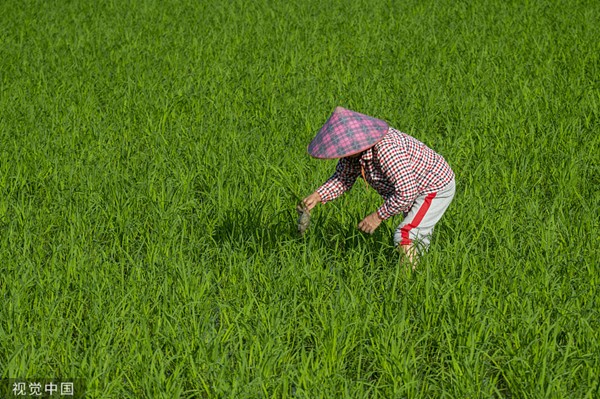
A farmer works on a farm in Qionghai, Hainan province, on Feb 7, 2023. [Photo/VCG]
HAIKOU -- After taking a stroll around a fruit planting base in Qionghai city of South China's Hainan province, people can taste varieties of tropical fruits that are not normally available.
The base, named Window of World Tropical Fruits, is a pilot zone of the agricultural industry in the town of Dalu in Qionghai. It is also a key project of agricultural opening-up and international cooperation in Hainan.
Up to now, the project has brought in over 500 kinds of tropical fruits from regions such as South America, Southeast Asia, and Australia, and has successfully planted more than 350 kinds of fruits. Twenty among them have been cultivated on a large scale in Hainan, such as yellow dragon fruit, Australian finger lime, and others.
At present, milk fruits, yellow crystal fruits, and finger lime are planted in 17 cities and counties in Hainan, covering an area of 2,000 hectares, including about 333 hectares in Qionghai city.
The plantation for finger lime has become the largest planting base and supplier in Asia, which has brought handsome benefits, according to Wang Qiao, general manager of Hainan Grand Modern Agriculture Development Co, Ltd.
"In our base, we have varieties of fruit trees with an area of about 33 hectares. We can earn 30 million yuan ($4.36 million) a year by selling seedlings and fresh fruits," said Wang.
Seeing the profit, nearby villagers started to plant finger lime and yellow dragon fruit. Now, high-efficiency agriculture of tropical fruit has become the leading industry for villagers in Dalu Town to live a better life, and more than half of the farmers are engaged in tropical fruit cultivation.
"The annual output value of yellow dragon fruit per mu (one hectare equals 15 mu) is about 80,000 yuan, and that of finger lime is 90,000 yuan," said Xue Honghai, Party chief of Shiqiao Village in Dalu Town.
The retail price of mamey sapote reaches 600 yuan per kg. Since 2022, villagers started to plant finger limes, which are growing very well. The base not only provides technical guidance but also is responsible for purchasing and selling the fruits, which brings villagers confidence, Xue added.
Currently, rural tourism featuring tropical fruits is booming in the city. After visiting the fruit orchards, people can enjoy a tropical fresh fruit platter by the lakeside. To meet the demands of tourists, the base has also built homestays in the orchards.
To bring in more good-quality fruits, the base has exchanged and cooperated with foreign countries. It has signed a strategic cooperation agreement with the Europe-China Cooperation Committee to export finger limes. Meanwhile, a modern industrial park for agricultural exchange and cooperation has been initially built in Qionghai, so it can facilitate extensive exchanges with other countries, including Thailand, Vietnam, and Cambodia.
Seeing the promising outlook, many locals who were working or studying in other places have returned to their hometowns to seek job opportunities. So far, the base has attracted 18 college students to return.
Zhao Dezhen, 27, is now in charge of seedling sales and planting promotion at the base. Previously, he worked in South China's Guangdong province after graduating from college.
"Now, I work near my home with an income of more than twice of working outside," said Zhao.